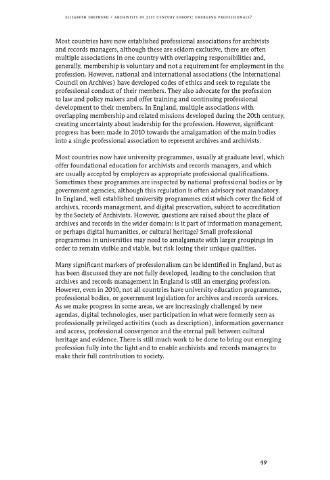Most countries have now established professional associations for archivists
and records managers, although these are seldom exclusive, there are often
multiple associations in one country with overlapping responsibilities and,
generally, membership is voluntary and not a requirement for employment in the
profession. However, national and international associations (the International
Council on Archives) have developed codes of ethics and seek to regulate the
professional conduct of their members. They also advocate for the profession
to law and policy makers and offer training and continuing professional
development to their members. In England, multiple associations with
overlapping membership and related missions developed during the 20th century,
creating uncertainty about leadership for the profession. However, significant
progress has been made in 2010 towards the amalgamation of the main bodies
into a single professional association to represent archives and archivists.
Most countries now have university programmes, usually at graduate level, which
offer foundational education for archivists and records managers, and which
are usually accepted by employers as appropriate professional qualifications.
Sometimes these programmes are inspected by national professional bodies or by
government agencies, although this regulation is often advisory not mandatory.
In England, well established university programmes exist which cover the field of
archives, records management, and digital preservation, subject to accreditation
by the Society of Archivists. However, questions are raised about the place of
archives and records in the wider domain: is it part of information management,
or perhaps digital humanities, or cultural heritage? Small professional
programmes in universities may need to amalgamate with larger groupings in
order to remain visible and viable, but risk losing their unique qualities.
Many significant markers of professionalism can be identified in England, but as
has been discussed they are not fully developed, leading to the conclusion that
archives and records management in England is still an emerging profession.
However, even in 2010, not all countries have university education programmes,
professional bodies, or government legislation for archives and records services.
As we make progress in some areas, we are increasingly challenged by new
agendas, digital technologies, user participation in what were formerly seen as
professionally privileged activities (such as description), information governance
and access, professional convergence and the eternal pull between cultural
heritage and evidence. There is still much work to be done to bring our emerging
profession fully into the light and to enable archivists and records managers to
make their full contribution to society.
ELIZABETH SHEPHERD ARCHIVISTS IN 21ST CENTURY EUROPE: EMERGING PROFESSIONALS?
49

